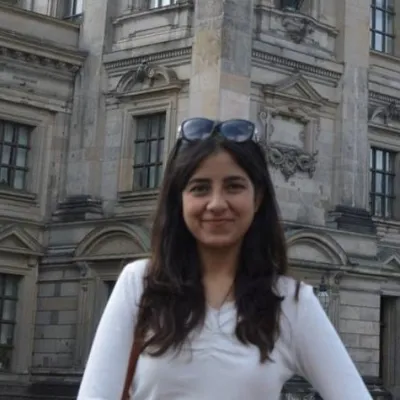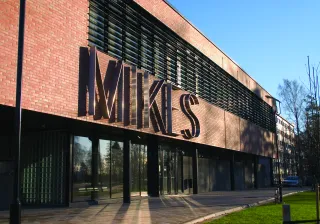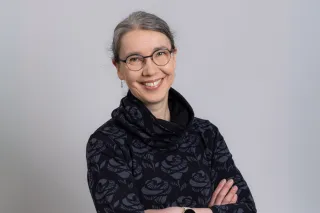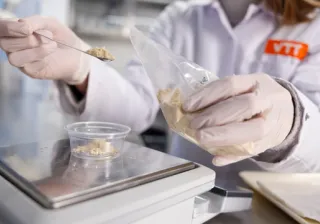Our Research Scientist Mehr Fatima visited Empa in Dübendorf, Switzerland for two and half months to focus on commercial devices used for environmental monitoring. The end target was to reduce its measurement uncertainty by developing correction strategies for post-processing of measurement data.
Mehr Fatima has been working at VTT MIKES on laser spectroscopy since 2019. She focuses detecting gas molecules and different isotopologues with different types of lasers. She has done her bachelor’s degree in electronics engineering and master’s in photonics. In addition to VTT’s project work, she is working on her dissertation at the moment.
“Typically, we have industrial measurements going on, but we also have research projects in our team. Our team is divided into two groups: one focuses on isotope spectroscopy and the other on hyperspectral imaging. I work mostly with isotope spectroscopy. I have had the opportunity to mainly work on EU projects and collaborate with some industries”, she says.
Visit to Empa in fall 2023
Mehr Fatima was interested in gaining international research work experience and networking with researchers outside VTT. After receiving funding from one of the EU projects, the opportunity arose to work at Empa for two and half months.
Empa, the Swiss Federal Laboratories for Materials Science and Technology, is a research institute that specializes in applied materials science and technology. It conducts research and development in various fields such as environmental technology, nanotechnology, renewable energy and sustainable materials. Its main campus is located in Dübendorf, near Zurich.
Empa has been VTT’s partner in joint European partnership projects in metrology over the past few years. Like VTT, Empa’s research group ‘Emissions and Isotopes’ also works on detecting isotopologues for industrial applications. It focuses on commercial devices, mostly Picarro’s, while VTT focuses on developing new devices for different applications for similar environmental measurements.
“Empa proved to be a good opportunity to gain experience on commercial instruments. Our goal was to develop correction strategies for the existing commercial device at Empa for nitrous oxide (N2O) isotopologue measurements by quantifying the effect of interferent gases (CO2, CH4 etc.)”, she says. Nitrous oxide is colloquially known as laughing gas.
Detecting nitrous oxide isotopologues
“My research topic at Empa was to improve the measurement uncertainties for nitrous oxide (N2O) isotopologues by finding out how to correct the uncertainties caused by interferent molecules while post-processing the measurement data. Nitrous oxide is a significant cause of the greenhouse effect and therefore, it is of utmost importance to monitor and reduce it from the atmosphere”, says Fatima.
“We got funding for similar measurements through the EU project quantiAGREMI (On farm quantification of ammonia and greenhouse gas emissions from livestock production). One of the goals of the project is to reduce the measurement uncertainty of the commercial device at Empa. This could be done by establishing the relationship and effect of interferant gases and isotopologues and then correcting for them. For this, we ran N2O isotopologue measurements in the atmosphere. As a next step, the effect of interferent gases was checked. We now plan on developing a correction strategy based on our measurements and to re-calibrate the device based on this correction factor. This would reduce measuring uncertainties of the device used for industrial measurements and applications”, she says.
“There was a lot to do during the short visit and therefore the measurements are still going on at Empa. At the moment, we are compiling the results and aiming to publish them together - hopefully this year”, says Fatima.
Commercial instruments are mostly used for environmental monitoring in different locations and sites to monitor the greenhouse effect. “Once you can measure something, only then you can reduce it”, says Fatima.
“I learned a lot about gas sensing and optical spectroscopy techniques, making new setups around a commercial instrument and operating them. I also learned what kind of software is needed for the measurements. I was mainly working on Picarro’s instrument - one of the most famous manufacturers.”
Fatima loved her stay at Empa and the small town of Dübendorf with its historical charm. “I received extensive support and guidance throughout my stay from the team members. It made my learning experience easy and enjoyable.”
She spent free time travelling in Switzerland on her own. “I absolutely loved the country and the culture. Luckily, I got to see both the autumn and winter landscapes. I explored a lot of cities - Lucerne, Bern, Geneva, Zurich. Empa arranged some lab visits and a mountain hike. When it comes to cuisine, I would call Switzerland the land of cheese. Swiss Quiche was my favourite”, she laughs.
Mehr Fatima says that the visit helped her to broaden her ways of thinking and learn new approaches to work. “I encourage everybody to go on a research visit at least once”, she says.
Dissertation under work at Aalto University
Mehr Fatima can now benefit from the technical skills she gained in her dissertation work. “It has helped me grow as an independent researcher, which is important for a PhD student. I will get some credits for the completion of my coursework at Aalto University, directed by Professor Erkki Ikonen. Furthermore, we plan to have a shared publication with Empa based on our results. That will help me meet the required criteria to complete my PhD.”






